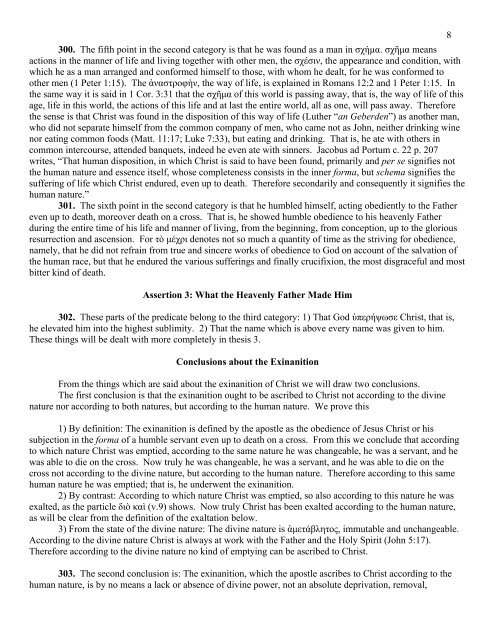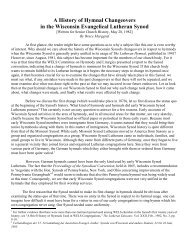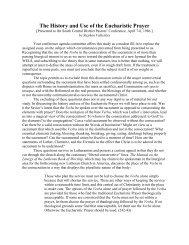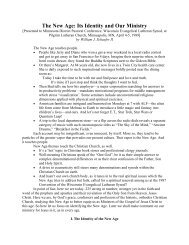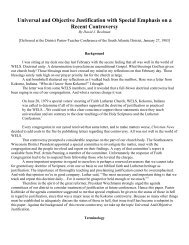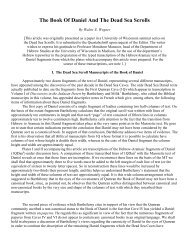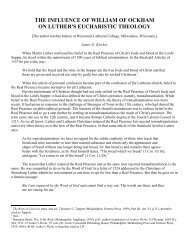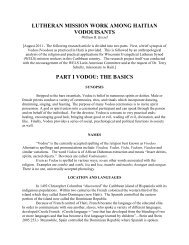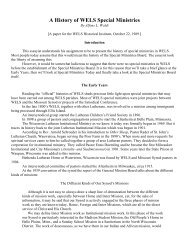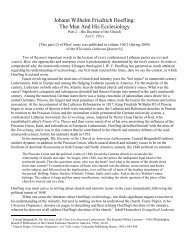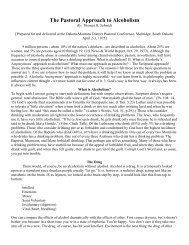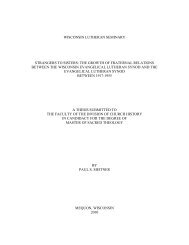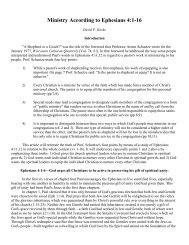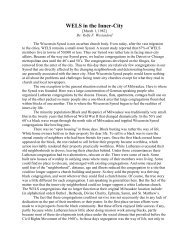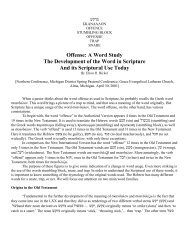Loci Theologici Loci Theologici
Loci Theologici Loci Theologici
Loci Theologici Loci Theologici
You also want an ePaper? Increase the reach of your titles
YUMPU automatically turns print PDFs into web optimized ePapers that Google loves.
8<br />
300. The fifth point in the second category is that he was found as a man in σχήμα. σχῆμα means<br />
actions in the manner of life and living together with other men, the σχέσιν, the appearance and condition, with<br />
which he as a man arranged and conformed himself to those, with whom he dealt, for he was conformed to<br />
other men (1 Peter 1:15). The ἀναστροφὴν, the way of life, is explained in Romans 12:2 and 1 Peter 1:15. In<br />
the same way it is said in 1 Cor. 3:31 that the σχῆμα of this world is passing away, that is, the way of life of this<br />
age, life in this world, the actions of this life and at last the entire world, all as one, will pass away. Therefore<br />
the sense is that Christ was found in the disposition of this way of life (Luther “an Geberden”) as another man,<br />
who did not separate himself from the common company of men, who came not as John, neither drinking wine<br />
nor eating common foods (Matt. 11:17; Luke 7:33), but eating and drinking. That is, he ate with others in<br />
common intercourse, attended banquets, indeed he even ate with sinners. Jacobus ad Portum c. 22 p. 207<br />
writes, “That human disposition, in which Christ is said to have been found, primarily and per se signifies not<br />
the human nature and essence itself, whose completeness consists in the inner forma, but schema signifies the<br />
suffering of life which Christ endured, even up to death. Therefore secondarily and consequently it signifies the<br />
human nature.”<br />
301. The sixth point in the second category is that he humbled himself, acting obediently to the Father<br />
even up to death, moreover death on a cross. That is, he showed humble obedience to his heavenly Father<br />
during the entire time of his life and manner of living, from the beginning, from conception, up to the glorious<br />
resurrection and ascension. For τὸ μέχρι denotes not so much a quantity of time as the striving for obedience,<br />
namely, that he did not refrain from true and sincere works of obedience to God on account of the salvation of<br />
the human race, but that he endured the various sufferings and finally crucifixion, the most disgraceful and most<br />
bitter kind of death.<br />
Assertion 3: What the Heavenly Father Made Him<br />
302. These parts of the predicate belong to the third category: 1) That God ὑπερήψωσε Christ, that is,<br />
he elevated him into the highest sublimity. 2) That the name which is above every name was given to him.<br />
These things will be dealt with more completely in thesis 3.<br />
Conclusions about the Exinanition<br />
From the things which are said about the exinanition of Christ we will draw two conclusions.<br />
The first conclusion is that the exinanition ought to be ascribed to Christ not according to the divine<br />
nature nor according to both natures, but according to the human nature. We prove this<br />
1) By definition: The exinanition is defined by the apostle as the obedience of Jesus Christ or his<br />
subjection in the forma of a humble servant even up to death on a cross. From this we conclude that according<br />
to which nature Christ was emptied, according to the same nature he was changeable, he was a servant, and he<br />
was able to die on the cross. Now truly he was changeable, he was a servant, and he was able to die on the<br />
cross not according to the divine nature, but according to the human nature. Therefore according to this same<br />
human nature he was emptied; that is, he underwent the exinanition.<br />
2) By contrast: According to which nature Christ was emptied, so also according to this nature he was<br />
exalted, as the particle διὸ καὶ (v.9) shows. Now truly Christ has been exalted according to the human nature,<br />
as will be clear from the definition of the exaltation below.<br />
3) From the state of the divine nature: The divine nature is ἀμετάβλητος, immutable and unchangeable.<br />
According to the divine nature Christ is always at work with the Father and the Holy Spirit (John 5:17).<br />
Therefore according to the divine nature no kind of emptying can be ascribed to Christ.<br />
303. The second conclusion is: The exinanition, which the apostle ascribes to Christ according to the<br />
human nature, is by no means a lack or absence of divine power, not an absolute deprivation, removal,


